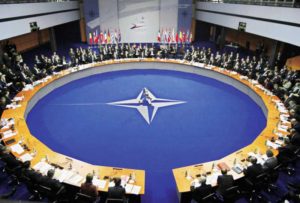The North Atlantic Treaty Organization once was “obsolete.”
Now it’s relevant.
That’s the former and current view of the president of the United States. What changed? What did NATO do to regain its status as a dependable and valuable defense treaty?
Donald John Trump met today with NATO Secretary General Jens Stoltenberg. The two men had a cordial and constructive meeting at the White House.
So here we are. The president who campaigned for office in 2016 while griping repeatedly about NATO’s obsolescence now says the organization is a partner in the fight against terrorism.
Will we learn from the president what changed his mind on this matter? Hardly. My guess is that even he doesn’t know, except that the secretary general told him that NATO matters.
Well, it does. It matters a lot.
The NATO alliance sits just west of its big and fearsome neighbor. I refer to Russia, which is governed by Vladimir Putin who — until just recently — seemed to be bound at the hip to Donald Trump. The bromance is fading quickly as the Trump administration starts turning the screws on Russia over its complicity in the Syrian civil war; oh, and Congress is starting to fire up the jets under Putin over his government’s role in seeking to “rig” the 2016 presidential election in Trump’s favor.
Yes, NATO came into being after World War II to deter potential aggression by the former Soviet Union. But in 1991, the Evil Empire disappeared, only to be replaced by another sinister governmental being. Russia has shown its aggressive self already, threatening Ukraine, retaking Crimea and blustering about re-conquering the Baltic States of Lithuania, Latvia and Estonia.
NATO now comprises 28 nations. Its relevance is quite vital to the stability of Europe, which remains crucial to the national security interests of the United States of America.
If only we could get the president to stop yammering about how NATO must pay its “fair share” or else. It’s the “or else” that some of us find most troubling.
My curiosity persists, though. What did NATO do to regain its status as a partner in the struggle to maintain international equilibrium?
